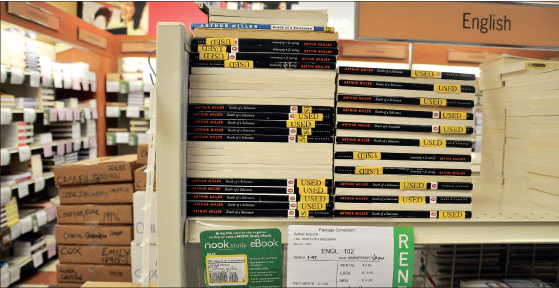Trading textbooks for technology?

Increases in e-book availability allow students to save money, but some are not ready for the change just yet

Options — Technology is now a common sight in college bookstores since the advent of e-books, access codes and clickers. Photo credit: Greg Leasure
According to the 2012 College Board Report, students spend on average approximately $1,200 per year on college textbooks, and this figure is steadily increasing. To combat further increases, college bookstores have worked to provide different ways for students to save money, and one popular strategy has been to provide textbooks that can be accessed online.
Over the past several years, the use of technology at the Liberty Bookstore, as well as other college bookstores, has vastly increased. Now devices such as the Amazon Kindle and Barnes & Noble’s Nook allow for thousands of books to be stored on a light and easy-to-carry device. The Liberty University Bookstore, part of Barnes & Noble College Booksellers, currently offers “e-books,” or digital versions of textbooks that can be accessed on both Mac and PC computers, as well as iPads. This alternative method allows for cheaper costs for students.
“E-books, on average, are typically 35-60 percent cheaper than a print copy,” Amber Kaufman, the textbook manager of Liberty’s bookstore, said.
According to Kaufman, the Liberty store currently offers e-books in about two-thirds of their inventory of textbooks, allowing students a cheaper, more affordable alternative to those clunky, expensive books. The option to rent certain books also allows students to use a physical copy of the book while still saving money.
“We’ve seen a pretty big increase in our digital sales in the fall of 2010, and the spring of 2011 was the first semester that we rolled out the rental program,” Kaufman said. “Having the rental price has made the books cheaper and more comparable to the digital price.”
Although trends tend to lean more toward the digital movement, Kaufman said that current students still seem to prefer the old paper and ink.
“I would always buy the print version, because I think there will always be something special about holding a book in your hands and turning a page,” Liberty graduate Zachary Schoonover said. “You don’t have that with a digital copy.”
“It depends on if I’m going to keep the book or resell it,” Liberty student Gabe Hernandez said. “If I’m planning on selling the book back, I would buy the hard copy. If it’s a book I know I would find an enjoyable read and want to keep, I would buy the digital version.”
For more information on how to save extra cash on books, or Barnes & Noble specials, visit liberty.bncollege.com.

I wish I had E-books available as an option to textbook when I was in school. As I recall the costs of textbooks was always a burden at the beginning of the school year.